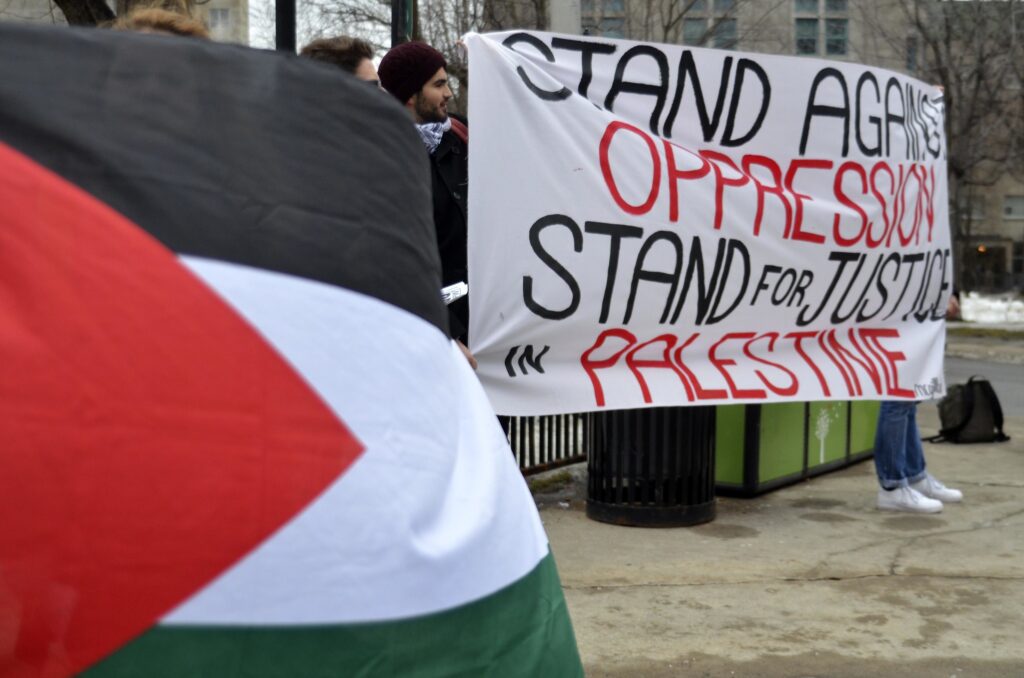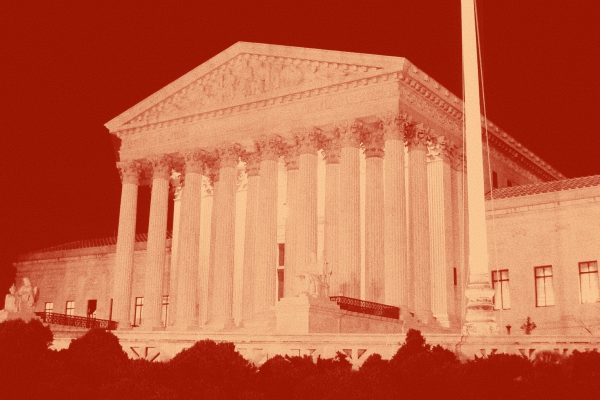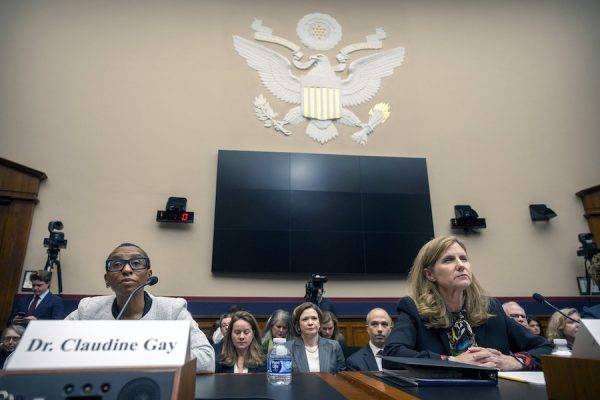In March of this year, administrators at the University of Texas, Austin, sent an email to senior staff with the subject line “URGENT: AIRBNB no longer allowed.” The message was bolded and highlighted in fluorescent green, and caused confusion among a number of professors, administrators, and students. Why would the university no longer reimburse Airbnb expenses, “effective immediately”? The email didn’t say.
It turns out that UT-Austin president Gregory L. Fenves believed he was complying with a 2017 Texas law, HB 89, which prohibits state agencies from contracting with companies that boycott Israel. Four months earlier, Airbnb had announced that it would stop listing properties located in Israeli settlements in the West Bank because the settlements contributed to “existing human suffering.”
We have the First Amendment right to protest state policies.
Airbnb’s boycott announcement was met with a boycott of its own. More than twenty-five states had laws on the books similar to HB 89, which would prevent state money from being spent on Airbnb. Some states—including Texas, Florida, and Illinois—vowed to divest from the company, and a group of Israeli settlers brought a discrimination lawsuit. Airbnb has since reversed course, announcing it would re-list the rentals but donate all the profits to charity. It maintains that its delisting plan never targeted the country of Israel: “Airbnb has never boycotted Israel, Israeli businesses, or the more than 20,000 Israeli hosts who are active on the Airbnb platform,” a company statement said.
Even if you don’t care about the specific policies of any one company or the decades-long fight over Israeli-occupation of Palestinian lands, it is important to understand what’s behind anti-boycott laws such as HB 89. Because what is at stake is not just where professors and students can stay while traveling for conferences, but how our basic First Amendment right to protest state policies is protected.
The BDS movement, active since about 2005, encourages boycotts, divestments, and sanctions (BDS) to exert pressure on Israel until it ends its occupation of Palestinian land; grants equal rights to Palestinian citizens of Israel; and recognizes the right of Palestinian refugees to return to their homes. Since 2014 twenty-seven states have adopted laws attempting to suppress the BDS movement. Anti-BDS resolutions are also being considered at the federal level. Many of these laws require entities that contract with the state to sign a certification that they do not, and will not, engage in a boycott of Israel during the term of their contract. Others mandate that the state create a list of businesses that engage in boycotts of Israel.
These blacklists and loyalty oaths are not simply a method to proactively affirm support for Israel, but also a tactic to discourage U.S. citizens and companies from taking part in campaigns to support Palestinian rights. Lawmakers have been remarkably candid on this front. Washington State senator Michael Baumgartner, for example, in vowing to introduce a bill that would prohibit universities from boycotting Israel, said his intention was to “prohibit” BDS and “just shut down these conversations [so] everybody can focus on . . . educating rather than being a politically-correct weapon.”
State Senator Bart Hester, the cosponsor of an Arkansas anti-boycott law, was similarly clear about that law’s purpose in an interview with VICE News:
Interviewer: But you’re not sanctioning another country, you’re sanctioning your own citizens.
Sen. Hester: Right, that we are. But we’re sending a message that says “hey, we are not going to stand by in Arkansas and let people take our tax-payer money against something that, our overwhelmingly, amount [sic] of taxpayers don’t believe in.”
Civil rights groups are challenging these laws on the basis that politically motivated boycotts are protected by the First Amendment, as established in the landmark civil rights case NAACP v. Claiborne Hardware (1982).
In NAACP v. Claiborne Hardware, civil rights activists promoted a boycott of white merchants to “vindicate rights of equality and of freedom.” The Supreme Court recognized that each of the elements of the boycott—banding together to pressure civil and business leaders to abide by a list of demands, supporting the boycott by “speeches and nonviolent picketing,” and encouraging “others to join”—is a “form of speech or conduct that is ordinarily entitled to protection.” Citing an earlier case as support, Justice John Paul Stevens wrote in the 8–0 opinion that collective action is “deeply embedded in the American political process.” By locating boycotts within the constitutional norm that recognizes that advocacy can alter orthodoxy, the Court affirmed that “through speech, assembly, and petition—rather than through riot or revolution—[the boycotters] sought to change a social order that had consistently treated them as second-class citizens.”
Almost every major social movement has, at some point, utilized boycotts as a method to raise awareness about a persistent social injustice.
Indeed, like the boycott of white-owned stores in the 1950s and ’60s—which emerged from a racial justice movement that utilized boycotts among other forms of protest—boycotts challenging Israeli state practices are a form of political protest arising from a movement demanding freedom, justice, and equality.
District courts in Arizona, Kansas, and Texas agree; the HB 89 law in Texas was enjoined just last month in a blistering decision after BDS supporters sued. “The only interest distinctly served by HB 89’s content- and viewpoint-based discrimination,” the district court judge wrote, “is displaying Texas’s special hostility to the BDS movement. . . . Particularly in light of the well-known Israel-Palestine conflict and the fact that HB 89 is referred by its sponsor, the governor, and news media as the ‘anti-BDS bill,’ the certification that one does not and will not ‘boycott Israel’ is a ‘political or ideological message’ the First Amendment prevents Texas from compelling.”
In Kansas, the district court judge wrote that the state cannot require contractors to adopt a particular viewpoint just because it may be favored by the state: “The conduct prohibited by the Kansas Law is protected for the same reason as the boycotters’ conduct in Claiborne was protected.”
Arkansas saw a different outcome, however. There, the Arkansas Times refused to sign a certification that it did not, and would not, engage in a boycott of Israel. Though the paper neither supports nor is against BDS, it refused to be compelled to take the state’s position against it. With help from the ACLU, it sued the state after it lost significant ad revenue from declining to sign the certification.
But the district court found that the act of boycott is “neither speech nor inherently expressive conduct” and thus is not protected by the First Amendment. (It also found that the First Amendment only covered political boycotts that vindicated a “domestic legal interest.”) The court relied on the Supreme Court case Rumsfeld v. FAIR (2006), which involved a First Amendment challenge brought by a group of law schools over a law that denied federal funds to universities that refused campus access to military recruiters. Rumsfeld v. FAIR, however, was not a boycott case—nowhere in it was the word boycott even mentioned. Moreover, the Supreme Court made clear that its decision was based on the fact that military recruitment receives particular deference as part of the government’s military powers, and therefore constitutes a very compelling state interest: “Judicial deference is at its apogee when Congress legislates under its authority to raise and support armies.”
The ACLU appealed the Arkansas decision, arguing that it would set a dangerous precedent by allowing government officials to punish disfavored viewpoints “based on nothing more than ideological hostility.” In its opening statement, the ACLU notes that Rumsfeld v. FAIR—which was decided over two decades after NAACP v. Claiborne Hardware—“did not abrogate constitutional protection for well-defined forms of collective protest, like boycotting, that are already ‘deeply embedded in the American political process.’”
Indeed, boycotts for Palestinian rights fall squarely within the U.S. historic tradition of constitutionally-protected expressive activity. An amicus brief filed by the Center for Constitutional Rights, Palestine Legal (where I work), and the Law Office of Matthew Strugar further explain how almost every major social movement has, at some point, utilized boycotts as a method to raise awareness about a persistent social injustice, beginning with colonists boycotting British goods to protest taxation without representation. This tradition continues into our own era:
In 1955, when Rosa Parks refused to give up her bus seat for a white person in Montgomery, Alabama, she sparked the Montgomery bus boycott to protest racial segregation in public transportation and began a chain reaction of similar boycotts throughout the South. In 1965, Cesar Chavez led the National Farm Workers Association to join a strike to protest working conditions for grape growers in California that eventually led to a nationwide boycott and major reforms.
And quite notably, the United States participated in a global boycott, divestment, and sanctions movement that helped dismantle apartheid in South Africa. The historical pedigree and legitimacy of boycotts as a tool to challenge injustice, including against another country, is unimpeachable.
Anti-boycott laws have real consequences—and not just for movements for Palestinian rights, but for the lives of residents. Consider the hurricane victims in Dickinson, Texas, who were required to pledge not to boycott Israel as a condition of receiving aid. Many of these people simply do not have enough information to articulate a view on the issue, yet they were being forced to hew to the government’s position. (After public outcry, the city determined that it had misapplied the Texas anti-boycott law.)
The unconstitutional efforts to prevent Americans from supporting BDS are having a Streisand effect, drawing more attention to the movement for Palestinian rights.
Anti-boycott laws also affect people who are trying, in their own small way, to support human rights. A speech language pathologist, for example, who had worked in Austin suburban schools serving Arabic-speaking students for nine years was unable to renew her contract with the school district because she could not, in good conscience, sign the required certification that she does not and will not boycott Israel. (The pathologist, Bahia Amawi, is one of the plaintiffs in the Texas lawsuit.)
My office has received reports from individuals in California, Texas, Ohio, and Washington who have lost contracts, believe they lost contracts, or declined or were denied payment because of their support for BDS. Students, professors, and administrators have questioned whether it is lawful to allow a speaker to give a talk supportive of BDS—or whether a speaker who publicly supports BDS and is brought to lecture about a different topic is allowed to speak at all.
States are now trying to avoid legal challenges to these laws by narrowing them to apply only to bigger companies that contract with the state. Kansas and Arizona have already done so, and a bill to amend Texas’s law is pending. But even with moderations, the unconstitutional efforts to prevent Americans from supporting BDS are having a Streisand effect, drawing more attention to the movement for Palestinian rights and giving the public new insight into the role our politicians play in facilitating Israel’s human rights violations. Consider the headlines in New York, when Nassau County threatened to take legal action if a local venue did not cancel performances by Pink Floyd cofounder Roger Waters because of his support for BDS. Florida lawmakers similarly invoked their state’s anti-boycott law in pushing for the cancellation of Grammy-winner Lorde’s concerts in early 2018 after she refused to perform in Israel in support for the boycott movement.
Despite efforts to silence the boycott movement, an increasing number of prominent individuals and institutions are protesting Israeli state practices that violate Palestinian rights, including by joining the call for BDS. Several major U.S.-based religious institutions have endorsed and participated in BDS initiatives, including the Evangelical Lutheran Church in America, the Presbyterian Church (USA), the Mennonite Church, and the United Methodist Church. Numerous foundations and pension funds—including the Bill and Melinda Gates Foundation, the Soros Fund, and TIAA-CREF—have divested from companies in response to their facilitation of human rights violations in Israel and the occupied Palestinian territory.
The point of anti-boycott laws is not to convince you of the merits of Israel’s policies toward Palestinians; it is to make it personally painful to publicly disagree.
According to National Students for Justice in Palestine, student governments at approximately fifty universities across the country have passed resolutions and referenda calling on their universities to divest from companies that are complicit in Israel’s human rights abuses. Acclaimed writers, artists, and professional athletes such as Lana del Rey, Lauryn Hill, Cornel West, and Michael Bennett have endorsed, participated in, or acquiesced to a cultural or travel boycott of Israel on account of its human rights violations.
Last month, Omar Barghouti, the cofounder of the BDS movement, was denied entry to the United States despite holding valid travel documents, including a U.S. visa. Barghouti, a permanent Israeli resident who is married to a Palestinian citizen of Israel, was scheduled for a speaking tour, but banned for “immigration reasons.” Because of the ban, he missed his daughter’s wedding, Skyped into his talks, and probably received more positive, prominent news coverage on the Palestinian struggle for freedom than if he had been allowed into the country. Indeed, he was humanized in a way Palestinians rarely are.
On the surface, then, the U.S. decision to ban him comes off as strange. That is until you realize the point of these anti-boycott laws and decisions is not to convince you of the merits of Israel’s policies toward Palestinians; it is to make it personally painful to publicly disagree.








